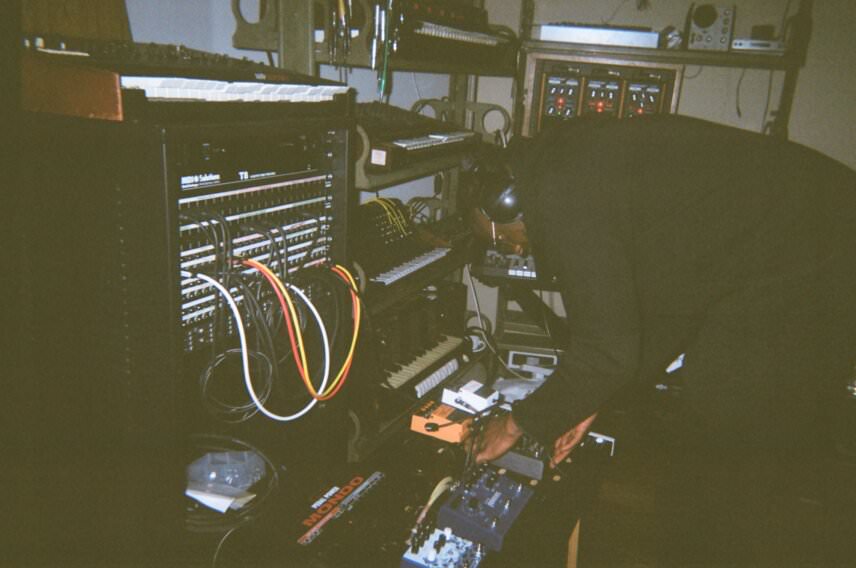Love Shodipe is a producer and engineer working at QMF (Quality Music Freak), a new outlet part of Spitfire Audio. We asked him to tell us more about his role in a division that represents a new face in a predominantly unchanging environment: film scoring, orchestra & tech.
Name?
Love Shodipe
Place of work?
Quality Music Freak, a new brand outlet of Spitfire Audio
Job?
Engineer
How long have you had the job?
3 Months. I was running my own studio/ artist development company prior to the gig and naturally, a few sessions overlapped – so we decided I may as well join full time!
What does a typical day involve?
I wake up and walk my dog. During the walk I check emails while listening to new music, or mixes from the night before. Typically the time I arrive at the studio depends on whether sessions are booked or our QMF Project workloads.
On session dates my journey to the studio will be a rotation of music from the artist I’m working with that day – it helps familiarise myself with the artist especially if we have not worked together. You can also get an initial read on how to set up the session within the DAW for the artist’s specific sound.
On arrival to the studio, I set up for the session. This period is usually an opportunity to catch up with the team about the day’s tasks. I like a relaxed and fun atmosphere in sessions as I find it allows everyone to express themselves more, which tends to aid the creative process.
I’ve no set times for lunch and tend to eat what’s in the area, it’s a decision that has served me well thus far. I heard the Spitfire Kitchen isn’t half bad – I haven’t had a chance to rummage through it yet!
At the end of the day after every session I typically spend about half an hour to an hour doing some house cleaning. This is making sure files are saved in the correct folders, forwarding artists/management files or things I may want to even work on from home. Most nights however, once everyone’s left I will open up mixes and work on them till ungodly hours.
The music business is not the same as making music. Don’t take it personally.
Highs of the job?
I’d say my introduction to the music industry began under extreme circumstances, so the area I find myself in today is pretty tame in comparison.
The equipment I’m using now is fairly similar to my entry point, but the advancements in technology I.E. how hardware integrates with software, it’s come a long way.
We started off using gear, it was no-nonsense and now we can do everything inside of the box. The access to somewhat inaccessible vintage gear is what makes this job so great – it excites me when I see new producers and artists eager to learn from us!
Lows of the job?
We rarely have time to digest a piece of art anymore and it correlates to parts of the creative process. There are days with 5 full recording sessions, and typically 2-3 mixes.
At times it’s difficult to track exactly what needs to be worked on, things are so fast-paced! The upside is I’m in a constant state of discovery.
How did you get the job?
I was conducting sessions in and out of varying studios. An artist and close friend of mine asked if I could engineer his session at “his friend’s studio”. My initial reaction was dismissive but I reluctantly accepted.
Upon arrival, I realised where I was and that sort of schoolboy excitement was hard for me to contain… I tried to engineer but couldn’t stop rambling on about the gear. I couldn’t grasp he’d skipped the fact we’d be working out of Spitfire Audio.
The session went great, it was pretty natural, as a new company they needed an engineer. I worked on a few sessions and agreed to be Head Engineer within QMF.
What did you do before this job?
Before QMF I ran my own studio in South Bermondsey.
Who you are in the town you’re from speaks volumes, so it was always important for me to connect with the community first. I engineered the vast majority of sessions at all the local studios.
After my first major break, I received numerous offers to help develop artists which was super exciting. What really turned heads was the work done with Sneakbo, we took a local talent and propelled it to a radio hit.
How can we get your job?
There are no rules, how can I articulate the path of continual learning. My only advice is to surround yourself with critical thinkers, people who make you constantly put into action the words you speak.
Who are the people who’ve had the biggest influence on your career and why?
It’s difficult to quantify a whos whos of influences, there are so many and each for ample reason.
To truly justify the direction of my career experience thus far I would have to say myself. I’ve genuinely followed the pace of my heartbeat and it’s served well.
Have you ever thought about going it alone?
There wasn’t much assistance by way of finance or guidance, a lot of my earliest experience was trial by fire. All my efforts were toward doing music as an occupation, and nothing was going to hinder this.
What’s the one bit of advice you wish you’d known at the beginning of your career?
The music business is not the same as making music. Don’t take it personally.
What’s the biggest mistake you’ve made in your career to date?
There was a period of my life I was completely absent from music, it was a span that lasted around 10 Years. Seeing my achievements over the last 3 years only makes me wonder where I’d be without the hiatus.
How would you like to see your industry develop over the next five years?
For Spitfire Audio via QMF to have gained strong grounds within celebrated Black music.
To create a new environment for new artists to thrive within the world of composition and tech. Mainly people who look like me, but also all people.
To be more inclusive of the word happiness. there’s a lot of pressure to succeed but it beckons the thought toward ‘is there enjoyment behind it all’? I think that’s what is really important.

